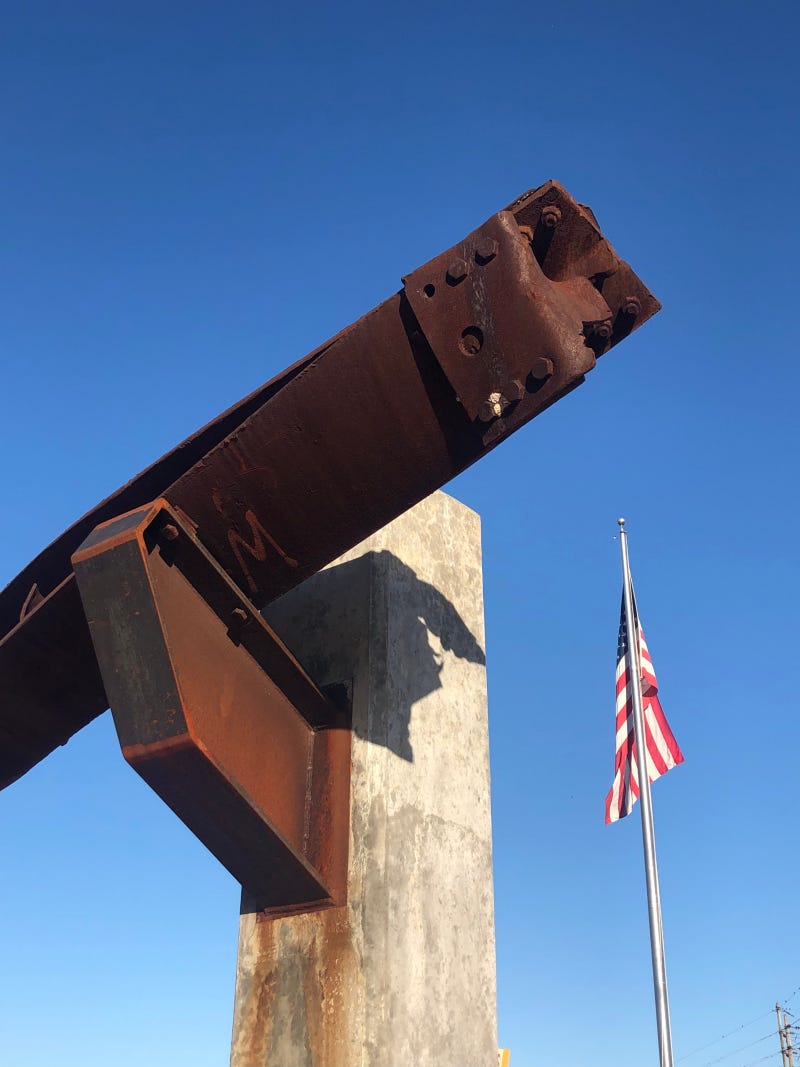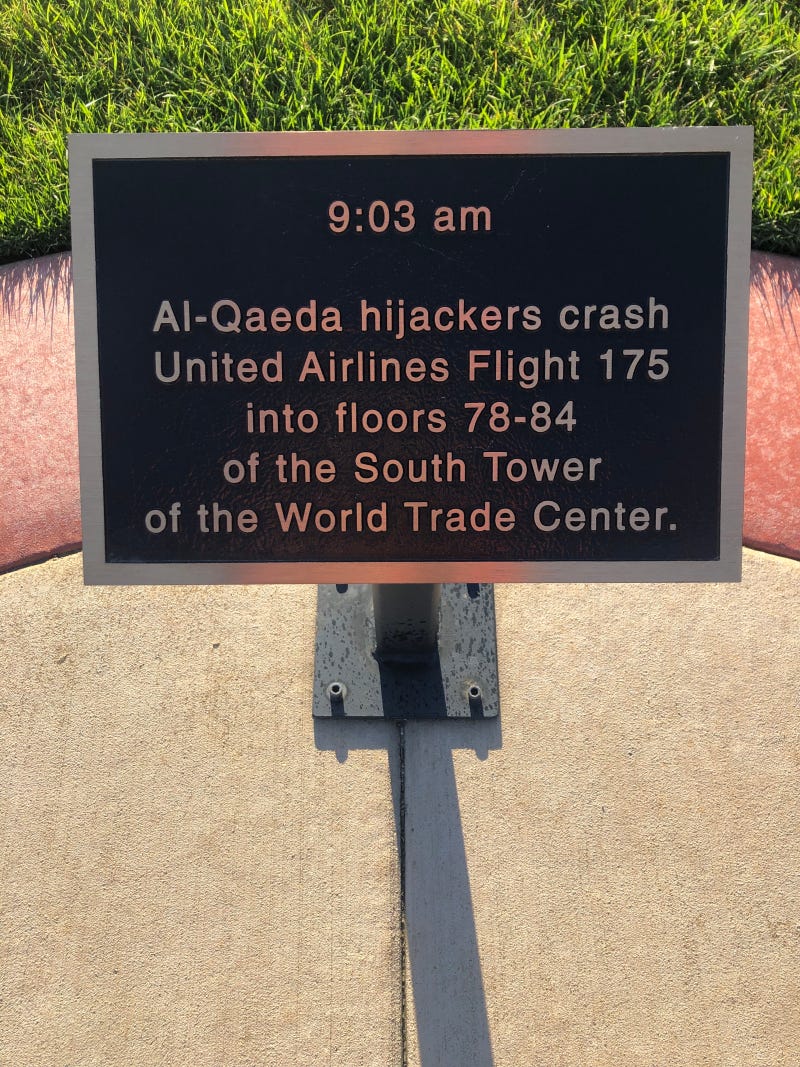Remembering 9/11 is good for your mental health
It was 22 years ago today, and we should never forget.
By Lisa Brunette
Note: I wrote this two years ago, on the twentieth anniversary in 2021, and I think it still holds up, especially the criticisms of pandemic policy and the failings of the Democratic Party.
The desire to forget is very human. Something bad happens, and we want to get through it and move on, forgetting it ever occurred. This can even be a healthy inclination, if we keep from getting stalled out, bogged down by grief or pain. But there’s a lot to be said for remembrance and acknowledgment as well. If we forget the past, especially if we forget wrongs done to us personally or to our people, forgetting can actually be dangerous.
I know as a victim of childhood trauma that in the absence of justice in particular, forgetting can be unhealthy. The body never forgets. If you try to smooth over the trauma, pretending it never happened, you can suffer nightmares and sleep disturbances, unresolved anger, and even symptoms of illness and distress.
So this late summer when we came upon the twentieth anniversary of the 9/11 attacks, it struck me that taking a moment to remember would not only be healthy but necessary.
But how and where to remember? I took a trip to New York in 2003 for a conference, and while I was there, I visited the World Trade Center site. At that time, it was a gaping maw in the ground, a hollow grave most notable for its bleak absence. What undid me was a child’s drawing in crayon, affixed to the chain-link fence surrounding the site: A set of massive inflatable slides, the kind you find on birthday party bounce houses, sweeping down from the upper windows of the buildings, allowing people to slide down to safety. Because ‘the falling man’ has been such a tragic emblem of that fateful day, the sweet desire of a child to save him moved me to tears.
Of course, this year, a trip to New York could not be in the plan. Anthony and I decided to watch 9/11 movies instead. We watched two, and of them, I can strongly recommend one: United 93. If there’s one thing we should remember most from that day, it’s that ordinary citizens, and not our government or military, which both failed us, are the ones who stepped up. United 93 tells the story of the one terrorist attack that was foiled on September 11, by a group of passengers who discovered what was happening and together took action. Their sacrifice should always be honored and remembered. The movie tells their story well.
But I wanted more than a movie to help me honor the day. You might not realize this, but there are 9/11 memorials all over our country, most of them in small towns. There’s one in Belleville, Illinois, where I lived for the bulk of my adolescent years and where part of my family still lives. Unfortunately, due to the pandemic, attendance at the ceremony held on September 11 this year was restricted, but Anthony and I finally got over to the park about a month later. It’s a well-designed outdoor memorial featuring a timeline walk marking the significant events of that day, with a large piece of the World Trade Center displayed on pillars as if it were a modern art piece.
There’s also a survivor tree, and even though it is the Callery pear, a species that is frankly a bit of a scourge, the sentiment, at least, stands strongly. Here’s the survivor tree story, according to the National 9/11 Memorial & Museum in New York:
In October 2001, a severely damaged tree was discovered at Ground Zero, with snapped roots and burned and broken branches. The tree was removed from the rubble and placed in the care of the New York City Department of Parks and Recreation.
After its recovery and rehabilitation, the tree was returned to the Memorial in 2010. New, smooth limbs extended from the gnarled stumps, creating a visible demarcation between the tree’s past and present. Today, the tree stands as a living reminder of resilience, survival, and rebirth.
Fruit from this original tree was used to grow additional seedlings, which is how the tree became part of the Belleville memorial.
The other thing I had to forgive in the memorial, by the way, was the twice misspelled “U.S. Capitol” as “Capital.” I apologize for my inability to turn off the inner grammarian.
But that’s life; it’s messy and imperfect, so this memorial would be no different. I highly recommend to everyone that you find the closest memorial to you and take the time out to go there and reflect on the events of that day. It could be good for your mental and physical health.
Here’s my 9/11 story.
I lived in Miami, Florida, from 2000 to 2002, so I was there during the attacks. I moved to the Pacific Northwest after that, and I always felt when I talked to people out there that they had a very different attitude toward 9/11 because most of them were literally still sleeping when it all happened, between the hours of 8 and 10:30 in the morning EDT, which for them would have been 5-7:30 am. But for those of us on the East Coast, the tragedy was immediate.
I was sitting in the graduate student lounge at University of Miami, typing at a computer. None of us had our own laptops back then. We used computer labs for all our grad student writing, when we weren’t at home working on behemoth desktops. Suddenly a friend of mine says, in his Jacksonville drawl, “Did y’all hear about a plane hitting a building in New York?”
Not too long before this, a small biplane had hit a building somewhere in Florida—maybe Tampa? So we thought it was something like that. Then the Internet went down, affecting our computers. We shrugged it off, grabbed our backpacks, and walked to seminar. There was a buzz around the seminar table as we tried to get the story, but nobody really knew what was happening, except that maybe it was a jet and not a small plane, which was hard for any of us to believe.
Shortly after we started our seminar discussion, a department admin came to the door and said the country was under attack, and the university brass had decided to evacuate the campus. Confused and frightened, we gathered our things and left. I’ll never forget walking through the quad and seeing Donna Shalala, who’d been the Health and Human Services Secretary under President Clinton but was then our university provost, standing there, yelling at everyone to vacate campus, now. It was surreal.
I got home in time to see the first tower fall.
My husband—not Anthony but my ex, an artist/musician named Tom—worked as an art handler at the main branch of the Miami Library, in Government Center. I hadn’t heard from him and was sick with worry. We didn’t own cell phones. At this point there was no way to know what was happening or if places like Government Center would now become targets.
But Tom made it home. Together we watched it all unfold on TV: A plane hit the Pentagon. The second tower fell. Then the plane down in Pennsylvania, the oddity, maybe a foiled attempt. Eventually it grew dark, but neither of us made a move to get up or turn on the lights. We watched it all unfold on our screen, holding hands, tears streaming down our faces.

I taught classes as a graduate teaching assistant, and two of my students were even closer to the tragedy: One lost a dear aunt, who was in the plane that hit the second tower. The girl was inconsolable that whole semester. Another happened to be in New York that day, and he’d barely escaped Wall Street.
For my MFA thesis, I was working on a collection of short stories inspired by my childhood as an Air Force brat. A youth spent practicing duck-and-cover at school and attending Air Shows came back to me with even greater vividness after the attacks. At one point, I realized I’d had my hair cut Air Force-regulation short and was wearing a pair of black pants with a stripe down the side and a blue button-down shirt. I looked like my father in his dress blues, as if I’d “signed up” to do my duty as chronicler.
For days and months after the attacks, the usual PTSD nightmares from my own childhood trauma colluded with this new tragedy to add visions of crashing planes and falling buildings to the repertoire. Low-flying planes unnerved me. When I finally flew for a job interview a few months after 9/11, I experienced a panic attack on takeoff even though I’d previously flown without incident and in fact loved flying.

If you were around in the early 2000s, you might remember the patriotic fervor that swept through America in the wake of our collective victimization. Back then, despite my military upbringing, I was the snarky liberal who forwarded to her friends email op-eds and articles questioning the post-911 narrative, at times to an extreme degree. I admit now that was exceptionally tone deaf, and I regret it. However, what transpired over the next decade or even two was worth questioning: The Republican Party and their neoconservative leadership leveraged the tragedy in order to increase their power and control, running roughshod over our civil liberties in the process.
This, also, we should not forget. Not only is forgetting unhealthy, but those who forget the past are doomed to repeat it. Tragically, it seems we have, as we are letting it happen all over again.
It’s the party I’ve voted for consistently for much of my adult life who is taking advantage now. The Democratic Party and their new Left leadership is leveraging the COVID pandemic in order to increase their power and control, running roughshod over our civil liberties in the process. I’m deeply ashamed of them, as we should all be.
Please feel free to share your own 9/11 recollections in the comments below. It might be cathartic. It might help you to acknowledge the truth of what happened that day, in your own words. Acknowledging the truth is the one power we have left.






Richard Gage, Architects and Engineers for 911 Truth, is a good source of information.
Powerful stuff, I was driving in to classes during the first crash and then spent most of the day in a student lounge with classmates watching the day unfold. My dad and uncle were both supposed to have meetings IN the towers in September and their meetings had been moved around and they were home.
I feel the same with the political side, except I was Republican and now see both sides taking advantage and power and feel helpless other than to do what I can for my family independently because power just wants more power.